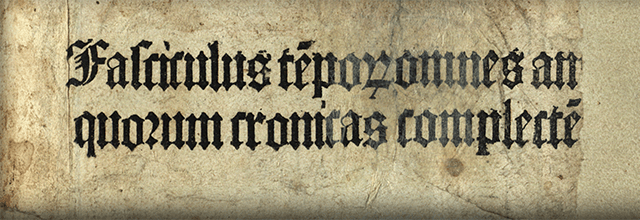Files
Download Full Text (151 KB)
Abstract
The Carthusian Order was founded in 1084 by St. Bruno of Cologne and a small number of followers, all seeking greater solitude and a more austere, contemplative monasticism. Carthusian monks lived predominantly isolated lives, only coming together co-operatively for prescribed religious purposes.
The intellectual and separate life of a Carthusian monk appealed to Werner Rolewinck (1425-1502), the author/compiler of the Fasciculus temporum, one of the two texts (together with the Malleus maleficarum) included in Portland State University Library’s late fifteenth-century codex. With its structure modeled on early chronicles and biblical conventions, its inclusion of a variety of woodcut illustrations, and its short, direct entries, the Fasciculus, true to its monastic roots, was intended to provide historical examples of good and bad conduct in a manner accessible to medieval audiences.
Publication Date
2020
Subjects
Incunabula, Historiography, History of the Book, Monasticism, Religious Studies
Disciplines
Christian Denominations and Sects | European History | Medieval History | Medieval Studies | Religion
Persistent Identifier
https://archives.pdx.edu/ds/psu/34820
Recommended Citation
Harris, Nathaniel, "The Carthusian Influence on Werner Rolewinck’s Approach to History" (2020). Fasciculus Temporum. 3.
https://archives.pdx.edu/ds/psu/34820

Included in
Christian Denominations and Sects Commons, European History Commons, Medieval History Commons, Medieval Studies Commons



Comments
This essay is part of a series of research projects written for Professor John Ott's Spring 2020 Medieval History seminar on PSU Library Special Collections' Malleus maleficarum and Fasciculus temporum codex.